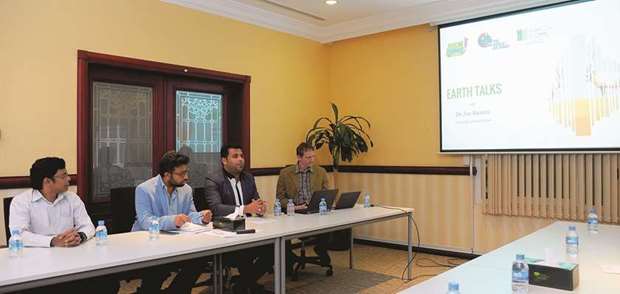Participants at a discussion on environmental issues on Monday evening highlighted that a holistic approach with multiple factors in focus is required to address the complex issue that mars the globe.
The event, titled as Earth Talks, was organised by Arab Youth Climate Movement Qatar (AYCM-Q) in partnership with Qatar Green Building Council (QGBC). This was the first in a new talk series to create awareness among the community about environmental issues. The event was organised at QGBC villa.
The talk series aims at stirring ecological consciousness of the public and different communities in Qatar. The series will focus on information dissemination and grassroots awareness activities, said Neeshad Shafi, who founded the AYCM-Q in 2015.
“We firmly believe in holistic ecological education and better understanding of human-nature interaction. The talks will bring new knowledge about collective intelligence, synergistic pathways and social learning on solving complex environmental problems,” Neeshad told Community. He is a design engineer from India by profession but has also been working as an environmental activist with different UN youth groups.
He said, “The AYCM-Q is a non-profit and volunteer organisation. The group aims at generating awareness on various interdisciplinary issues with special focus on the environment and climate change. The organisation is managed by part-time, yet fully committed volunteers and co-ordinators. The members are qualified on issues related to environmental education, global climate politics, environmental policy in the Gulf and the Arab regions. In the last two years, AYCM-Q has worked with various local stakeholders in organising or co-organising events on awareness, advocacy and action in various environmental issues.”
About the QGBC, he said, “The council is a non-profit, membership-driven organisation providing leadership and encouraging collaboration in conducting environmentally sustainable practices for green building design and development in Qatar. The QGBC also aims at supporting the overall health and sustainability of the environment, the people, and economic security in Qatar for generations to come. The council, a member of Qatar Foundation, was formally established in 2009 by a decree signed by Her Highness Sheikha Moza bint Nasser and has been helping Qatar on its journey to establish a post-hydrocarbon, knowledge economy and progressive society.”
The key speaker at the talk was Dr Joe Ravetz from Manchester University in the UK. He was on a visit to Qatar to attend an international conference on environmental issues.
He is the co-director of the Centre for Urban Resilience & Energy at the university. He has pioneered the art of strategic thinking for sustainable cities and regions, which brings together environment-climate policy, urban planning and design, new economics and governance, innovation and future studies, systematic thinking and complexity of science. With a background as an architect, planner and development manager, he is also a creative graphic facilitator and foresight trainer. He has also written many books.
In his presentation “Low Carbon Pathways from Local to Global”, Dr Joe used innovative visual methodologies to simplify the complex problems in a systematic way.
He said, “There is no one point solution to the complex problem. We need to work with multiple factors such as economy, culture, urban planning, collective intelligence, social behaviour, etc. We need to synergise and include all factors for better solutions.”
He noted, “In Manchester, when a construction project is conceived, it passes through different stages before finalisation. It has to go to the government, to the contractor, the municipality, the local leaders, and the environmentalists. There is no single solution available.”
“There is a need to involve young people and create awareness about the issue. Young people can make a difference. We need to make people aware about the issue. There should be discussions at government level, at professional level, at community level, and even at family level. Once the public is fully conscious and aware of the issue, the policies can easily be changed and formed for better environment,” he said.
Dr Joe, appreciating policies of the Qatari government, said, “I like their vision of 2030, where they focus on a knowledge-based economy. They have already started thinking about the post-carbon era.”
After the presentation, there was a brief Question and Answer session.
Talking to Community, Thierry Lesales, a geographer and environmental journalist with ORYX FM Radio, said, “It was visually entertaining and at the same time an intellectually rich that talk helped us to understand the complex challenges of our societies. I learnt a great deal about the various interlinkages and synergies of global low carbon transition.”
Sayeed Mohammed, a PhD student at Queensland University of Technology Australia who has been working on political economy of low carbon transition in Qatar, said, “There are no easy approaches in solving the problems of today; we need greater collaboration and co-operation at multiple scales (local to global) and within and across institutions. I see that Qatar could benefit a lot from greater collaboration and co-operation with different institutions and develop positive synergies.”

IN SESSION: The event was the first in a new talk series to create awareness among the community about environmental issues.
